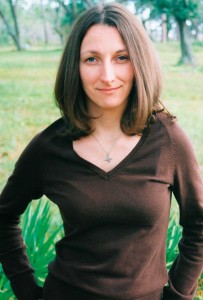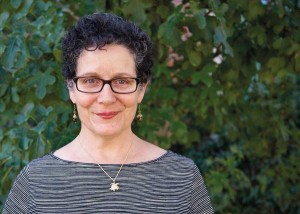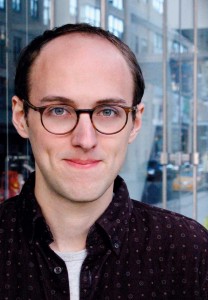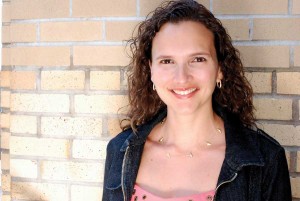 BRIDGET LEAK
BRIDGET LEAK
Profession: Director
Hometown: An army brat, she grew up in Europe and around the U.S.
Current home: Cincinnati
Known for: Mounting flash mobs and site-specific shows with her company Queen City Flash in Cincinnati. Most recently she directed The Complete Tom, a new four-play cycle of Mark Twain’s works of Tom Sawyer, and Andy’s House of [blank], cowritten by her husband, Trey Tatum, at Know Theatre. She also directs the touring outreach shows at Cincinnati Playhouse in the Park.
What’s next: Queen City Flash is currently creating Walpurgisnacht, a multidisciplinary show in which the content as well as the show’s location are kept secret from the audience until the last possible moment. Queen City Flash is working with Cradle Cincinnati to create a piece to impact behavior around infant mortality, the incidence of which in Cincinnati is double the national average.
What makes her special: KJ Sanchez, playwright and CEO of American Records, directed a production of Venus in Fur at Cincinnati Playhouse in the Park with Leak as her assistant. “Bridget is one of the most fearless, joyful, creative, smart, mindful, and talented young directors I’ve come across. What she is doing in Cincinnati is so darn cool. I’ve been to one of her flash mob shows, and it’s fun from the moment you get the text telling you where to show up, to the beautiful walk through the woods to get to your destination, to watching the sunset as fireflies hover behind her ridiculously charming shows. Seriously, she’s so great it makes me crazy.”
How she feels about her local theatre scene: “There is an audience here that wants to see new theatre, and different types of theatre, and they are willing to trust me and follow me into the woods to see stories of Tom & Huck along the Ohio River. There is a sense of adventure, and also a lot of money for the arts here.” Having been an army brat and “sort of a nomad,” she confesses that she’s “never really settled down anywhere. But I think Cincinnati might be the final spot for us.”
 ELSBETH M. COLLINS
ELSBETH M. COLLINS
Profession: Director of production and associate professor at the University of Southern California
Hometown: Greensburg, Pa.
Current Home: Los Angeles
Known for: Most recently, she oversaw a student production of Caryl Churchill’s Love and Information at USC. “It went as smoothly as you’d hope a tech would go, and in a student environment that is not always the case,” says Collins. This past summer, Collins stage-managed The Gospel at Colonus at Ebony Repertory Theatre, which she calls one of the high points of her theatrical life. One of her most memorable projects was assistant-stage-managing An Enemy of the People at the Ahmanson Theatre.
What’s next: José Rivera’s Marisol, and also Stephen Sondheim and Hugh Wheeler’s A Little Night Music at USC, the second of which Collins previously worked on at the Doolittle Theatre. Also on the horizon: a repertory of three plays with the MFA acting program, including The Threepenny Opera, Twilight: Los Angeles, 1992, and an original work by USC MFA director David Bridel.
What makes her special: “She is one of those special people preparing future artists while still stepping into the booth from time to time to run a show,” says playwright Brian James Polak. “You will never hear a current or former student utter a negative word about Els. She is an incredible teacher and advocate. She and her husband, actor James Green, attend virtually every production on USC’s campus, and when they aren’t attending theatre on campus you can find them attending plays around L.A., because they are just as supportive of the theatre community at large as they are the USC community.”
What she tells her students: “As ephemeral as the work is that we do on the stage, the relationships and the emotional importance of those relationships and the synergies that happen in the rehearsal hall and in the theatre are tangible and permanent,” she says. “Never say no [to a project] out of fear; embrace it.” She adds: “A stage manager needs to lead with grace and flexibility.”
 MARISELA TREVIÑO ORTA
MARISELA TREVIÑO ORTA
Profession: Playwright
Hometown: Lockhart, Texas
Current Home: Iowa City, Iowa
Known for: Heart Shaped Nebula at Shotgun Players in Berkeley, Calif.; The River Bride at AlterTheater Ensemble in Santa Rosa, Calif.
What’s next: The River Bride at the Oregon Shakespeare Festival, Feb. 21–July 7, 2016.
What makes her special: Playwright Larissa FastHorse, who got to know Orta at AlterTheater’s AlterLab, recalls that her colleague was “working on her trilogy of grim Latino fairy tales for adults. Her imaginative, magical writing speaks for itself, but it was Marisela’s strong voice and generosity of spirit that drew me to her. She knows who she is as an artist and supports her fellow artists all along the way.”
What inspires her: “I’m a poet turned playwright—my poetics are very present in my playwriting. I aspire to write plays with my imagination unrestrained, where often the emotional world of the play impacts the physical world onstage. I write plays featuring a variety of Latino characters, from recent immigrants to third-generation American citizens, in a range of plays—love stories to social-justice pieces to fairy tales for adults—to demonstrate the breadth and dimension of my cultural community.”
 MAIESHA McQUEEN
MAIESHA McQUEEN
Profession: Actor, singer, songwriter, educator
Hometown: Atlanta
Current homes: Atlanta and New York City
Known for: Chasin’ Dem Blues: The Untold Story of Paramount Records at Atlanta’s True Colors Theatre Company; Ain’t Misbehavin’ at Oregon’s Portland Center Stage
What’s next: Sirens of Song at Milwaukee Repertory Theater, running March 25–May 29, 2016.
What makes her special: “Maiesha McQueen is a chameleon on- and offstage,” says Kenny Leon, artistic director of True Colors. “She moves and delivers language in a variety of ways, depending on the need of the character. Her voice is velvet and her delivery is always authentic and original.” He’s also appreciative of her forthrightness about her change of direction: “After teaching for most of her early career, she said to me that she was ready to act full-time. Like any great artist, she understands the rewards of making choices, and as her choice is to act now, it’s a gain for all of us lucky enough to see her onstage.”
What inspires her: “I am most inspired by the beauty of the human struggle and what I believe is everyone’s intrinsic desire to find love and to be a manifestation of that love,” says McQueen. “I strive to do work that exemplifies the fight of the human spirit and of the human condition. That fight can be a personal one, it could be explored within relationships, or it could be reflected within the history and/or the plight of a community or a certain group of people.”
 NOAH MEASE
NOAH MEASE
Profession: Prop designer and playwright
Hometown: Williston, Vt.
Current home: The Bronx
Known for: Designing props for Annie Baker’s John at New York’s Signature Theatre, Branden Jacob-Jenkins’s An Octoroon at Soho Rep and Theatre for a New Audience, and Bess Wohl’s Small Mouth Sounds and the Debate Society’s Jacuzzi at Ars Nova.
What’s next: Designing props for MCC’s production of Noah Haidle’s Smokefall, which runs Feb. 4–March 13, 2016. (A frequent collaborator, Mimi Lien, is designing the set.) He’s also writing two plays about people’s relationships with objects: one about a superhero comic book, the other about a giant taxidermy moose.
What makes him special: Oliver Butler, who directed and developed the Debate Society’s Blood Play and Jacuzzi, calls Mease “an artist with the eye for great objects and the skill to make incredible props, but with the sensibility of a playwright. Coming from a company that sometimes creates plays around incredible artifacts, the work with a props designer is essential. And it’s no surprise that everyone he ends up working with goes to great lengths to work with him again.”
How he works: Mease originally moved to New York to pursue playwriting and fell into prop design through his work with the Debate Society. “I always approach the design through dramaturgy; I work really hard to build close, collaborative relationships with the directors and playwrights I work with, to be an active part of the creative team figuring out the play, which is not always the way the props job is structured,” Mease says. “My favorite shows to design are the ones where it feels like, by defining the details of the world, deepening the histories of characters, underscoring the themes, I’m writing footnotes to the play. I really see the work of writing the play and designing the props as two applications of the same storytelling impulse.”
 ROBERTA MAIA PEREIRA
ROBERTA MAIA PEREIRA
Profession: Producer
Hometown: Born in Rio de Janiero, Brazil, partly raised in London and New York City
Current home: New York City
Known for: Pereira is currently producing director of the Playwrights Realm and managing editor of Dress Circle Publishing, a theatre-themed book company. She previously worked as a producer at SITI Company and at Bisno Productions, where she was part of the producing team for shows on Broadway (Grace, Mothers and Sons) and in London (Merrily We Roll Along).
What’s next: The next Playwrights Realm production, slated for January, is Sojourners, about a Nigerian immigrant to the U.S. faced with a tough decision. Playwright Mfoniso Udofia’s won’t face such a hard choice, thanks to the organization’s support. “So many companies are about producing new plays, but Playwrights Realm wants to support the person writing the play,” Pereira says. In practice, that means that Udofia will be with the company for a whole year, provided with free rein over the troupe’s office and conference room, plus a year of health insurance.
What makes her special: Playwright Marc Acito appreciates that Pereira’s tastes “straddle the divide between uptown and downtown. She is attracted to the experimental but has a realistic understanding of the needs of the commercial marketplace.”
Why she left commercial producing: She made the transition back to nonprofit producing, she says, because of her “passion for working with emerging playwrights and new work.” That passion takes a very practical shape. As she puts it, “In many nonprofit companies, the administrative and artistic side don’t speak to each other so much. But I’m as comfortable with an Excel budget spreadsheet as I am talking with a playwright about a new draft. A lot of times artists will become producers by default because they want to make their work happen, but it’s not what they really want to be doing. You need someone to wear the producing hat, who can look at artists and say, ‘I want to make this happen.’”


